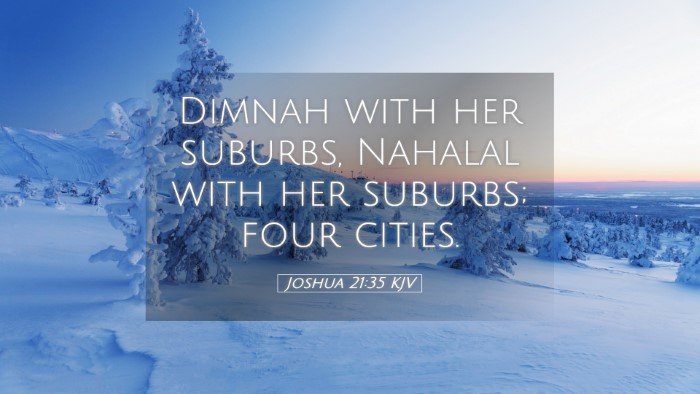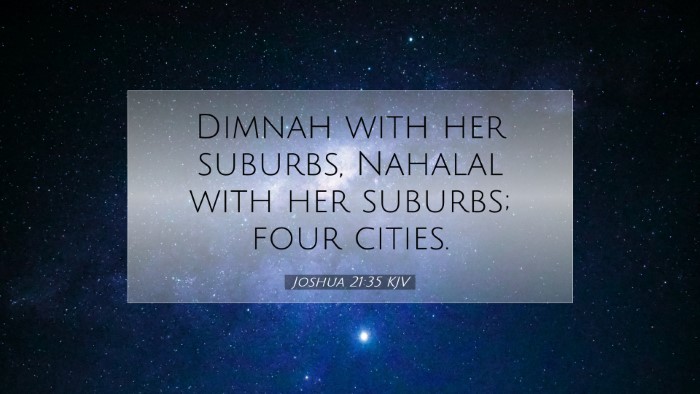Commentary on Joshua 21:35
Verse Summary: Joshua 21:35 reads, "And Heshbon with her suburbs, and Jazer with her suburbs, which are in the wilderness, were the cities of the Reubenites." This verse lists two cities designated for the tribes of Reuben, emphasizing God's faithfulness in providing cities of refuge and sustenance for His people.
Contextual Background
In the broader context of the book of Joshua, this verse is part of the distribution of the Promised Land among the tribes of Israel. The allocation of cities, particularly to the Levites and the tribes of Reuben, Gad, and the half-tribe of Manasseh, reflects God's provision and the fulfillment of His promises.
Insights from Public Domain Commentaries
Matthew Henry's Commentary
Matthew Henry emphasizes the significance of the cities allotted to the Reubenites, tracing their historical importance. He notes that the mention of Heshbon and Jazer reflects not only geographical allocation but also spiritual implications, suggesting God's intention for these cities as places of refuge and community for His people. Henry points out that the distribution of cities shows the orderly and wise governance of God, who ensures that every tribe is provided for according to His divine plan.
Albert Barnes' Notes on the Bible
Albert Barnes provides detailed insights regarding the cities mentioned. He elaborates on Heshbon as a significant city that was formerly the capital of the Amorite king Sihon. Barnes highlights the military and strategic importance of Heshbon and how it served as a reminder of God’s victory over their enemies. Jazer, on the other hand, is noted as a city within a region that must be understood in its pastoral context. These cities represent not just physical locations but also theological truths about God’s protection and provision for His people.
Adam Clarke's Commentary
Adam Clarke focuses on the topographical aspects of the verse. He describes the wilderness context around these cities, indicating that while they were positioned in less favorable geographical circumstances, they served specific purposes according to God’s plan. Clarke underscores the notion that even in wilderness areas, there is a promise of habitation and sustenance through divine providence. He correlates this with the spiritual wilderness that many face, wherein God still provides refuge in Christ.
Theological Implications
This verse sheds light on several theological themes:
- Divine Provision: The distribution of cities underscores God's provision for His people, a theme that resonates throughout Scripture.
- Restoration and Safety: The concept of cities of refuge indicates a God who desires safety and cities of belonging for His people amid conflict.
- Historical Significance: The cities are not merely geographical entities but hold historical weight that reminds the Israelites of God’s past faithfulness and present care.
Practical Applications
This verse and its accompanying insights provide meaningful applications:
- Encouragement in God's Provision: Pastors and spiritual leaders can draw strength from this assurance when guiding their congregations through times of need.
- Emphasis on Community: The cities symbolize the importance of community within the church; believers are called to be places of refuge for one another.
- Faith in Wilderness: The reminder that God provides even in wilderness seasons offers hope and reassurance to those feeling lost or abandoned.
Conclusion
Joshua 21:35 is laden with rich insights regarding God’s provision, the significance of community, and the assurance of safety for His people. Those studying this verse in depth, including pastors and theologians, will find both historical and contemporary applications that resonate with the fundamental tenets of faith and reliance on God’s promises.


